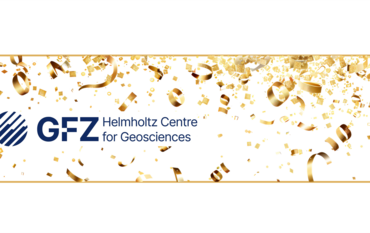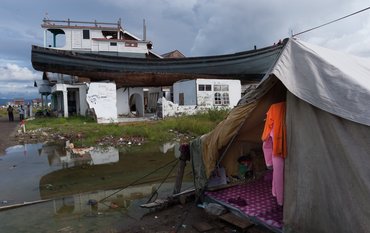Dr Theresa Hennig, head of the “Geochemistry of Disposal” working group at the GFZ Helmholtz Centre for Geosciences, was awarded the ECS Award for early career researchers for her poster presentation on the 9th “International Conference on Clays in Natural and Engineered Barriers for Radioactive Waste Confinement”. Her poster presentation took the title “Neptunium migration in Opalinus Clay – one experiment with multiple numerical geochemical solutions”.
The conference took place from 25.-28. November 2024 in Hannover, Germany. Its focus was clay as host rock for geological disposal of radioactive waste and the use of compacted swelling clays as an engineered barrier component, considering design, construction, operation and post-closure. In total 460 participants from more than 25 countries saw around 100 oral presentations and 250 posters.
The poster award specifically highlights outstanding science by the future generation of clay-radwaste scientists.
The awarded research on Neptunium migration in Opalinus Clay
Part of the safety assessment of potential disposal sites for high level radioactive waste is the quantification of radionuclide migration through the rock unit hosting the repository. Neptunium, in particular the isotope 237Np, is a component of high-level radioactive waste with a long half-life of 2.1 Million years and high radiotoxicity, and therefore relevant in the context of deep geological disposal. Theresa Hennig studied Neptunium migration based on scenarios with increasing complexity in terms of the processes considered. She applied process based reactive transport simulations considering the geochemical conditions and water rock interactions. For the example of neptunium diffusion experiments with Opalinus Clay, she showed the bandwidth of feasible models to demonstrate how important the combination of simulations and a comprehensive experimental characterisation is to unravel and quantify radionuclide transport processes.
About the person
Dr Theresa Hennig has been head of the “Geochemistry of Nuclear Waste Disposal” working group in Section 3.4 “Fluid System Modelling” since 2024. She had already been working there as a post-doctoral researcher since 2022. The geoecologist had previously completed her doctoral thesis on uranium migration in Opalinus Clay at the University of Potsdam and the GFZ. For her thesis, she was awarded the Friedrich-Robert-Helmert Prize of the Friends and Sponsors of the GFZ in 2022 and the Dissertation Prize of the Universitätsgesellschaft Potsdam e.V. in 2023. Her research focuses on hydrogeochemical modelling and reactive transport simulations, particularly in the context of radioactive waste disposal. Since 2023, she has also been a member of the GFZ's internal Scientific Council.












![[Translate to English:] Map Myanmar](/fileadmin/_processed_/b/4/csm_20250328-1300-Slider-01_EarthquakeExplorer-GFZ_da0a9ba102.jpeg)


![[Translate to English:] A painted, open book from which various contents fly up, with the words “Open Science Day 2025” above it](/fileadmin/_processed_/e/e/csm_20250325_Open-Science-Say-2025_-c-pengzphoto-adobe_43fc9b32de.jpeg)



![[Translate to English:] Portrait von Philipp Weis](/fileadmin/_processed_/9/8/csm_Weis-Phillip_-c-Michael-Bahlo_d7f6b4f946.jpeg)




![[Translate to English:] Portrait Prof. Warner Marzocchi](/fileadmin/user_upload/Warner_Marzocchi.jpg)
![[Translate to English:] [Translate to English:] Portrait Johann Komusiewicz](/fileadmin/_processed_/0/4/csm_Johann_Komusiewicz_schwarzer_Rahmen_b9c0619756.png)

![[Translate to English:] Fire in a forest, smoke rising, aerial view from above](/fileadmin/_processed_/8/3/csm_2025_01_06_AdobeStock_415831729_5a0e6d50d3.jpeg)


